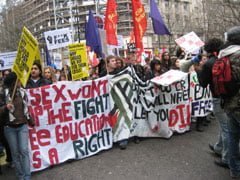 At midday on Wednesday 25th February over 1,000 students from over 20
At midday on Wednesday 25th February over 1,000 students from over 20
universities, schools, and colleges, along with recent graduates and young
workers, gathered outside the School of Oriental and African Studies (SOAS) to
protest (nominally at least) over the issue of top-up fees for university
tuition.
First of all, some background. Up until 2006-07, any student at university
would be required to pay somewhere between nothing and £1,250 for tuition, and
could receive up to £4,000 as a student loan, both of which were means-tested
based on parents income. Whilst this was vastly better than what students
currently face now, we should not forget that only a generation ago tuition
fees were zero for everyone, and everybody received a grant, i.e. money they
didn’t have to pay back! After 2006-07, all students at University were charged
"top-up fees", which could be anything up to a "cap" of £3,200
per year. It was recognised by all at the time that this was just the first
step, and that the cap of £3,200 would eventually be removed, opening the
floodgates for universities to charge whatever extortionate rates they felt
like. Lo-and-behold, only a few years later, and talk of removing the cap and
fully exposing universities to the market is back on the agenda. All of this
has happened under the watch of New Labour since they came to power in 1997.
Having realised their power and found their voice over the past couple of
months through the occupation of campuses, university students, under the
banner of the national campaign of "Another Education is Possible", marched
through the streets of London from the University of London Union (ULU) to
outside Kings College London (KCL), with a mood that was both militant but also
jovial, with chants such as "Gordon Brown’s a Tory, he wears a Tory hat;
and when he saw our top-up fees, he said ‘I’ll double that’".
However, whilst it was encouraging to see so many students and youth actively
protesting, it was clear that the protest suffered from the same problems as
the recent occupations. Firstly, the composition is still very diverse; all the
sects had a presence, and there was a large and noticeable anarchist
involvement. Talking to a comrade about my experiences during the Cambridge occupation, I
was quickly accosted by some masked students, clad in black, who confronted me
over my criticism of "consensus decision making" and the way in which
it stifles progression. Midway through the march a large group of anarchists
also chose to take "direct action" and sit down in the middle of a
road that was already closed for us to march along. This ineffectual and futile
attempt at causing disruption did nothing but annoy the majority of other
protestors as the police stood by and watched on nonchalantly.
Secondly, there is still no working class orientation to the student movement.
There were a couple of chants mentioning the need for students and workers to
unite, but in the pre- and post-march rally speeches, there was very little
mention of how this was part of a wider social movement that needed to link up
with the trade unions. Much of this has to do with the lack of leadership in
the student movement, which certainly isn’t coming from "Education Not for
Sale", which is merely a front for the confused
Alliance for Workers’ Liberty. Meanwhile the Socialist Workers’ Party
is interested in nothing but recruitment. During the occupation at Cambridge I found that
much of the discussion was directionless, and as soon as I made any concrete
suggestion or intervention, things would progress much faster. A similar need
for direction is needed in the wider student movement, and this must come from
Marxists, such as Socialist Appeal comrades, who can intervene effectively and
now reach a wider audience with our strong ideas.
Thirdly, there was no mention of the need to take over and change the only mass
organisations that are available to students – their university unions and the
National Union of Students (NUS). The NUS have stood back and done nothing to support
students for years now, especially over the past couple of months, and Wes
Streeting, the president of the NUS, has refused to back the campaign against
top-up fees, and has condemned the recent Gaza protests. Meanwhile, many
individual university student unions have refused to support any activism
against top-up fees, and as a result many students were at the march on
Wednesday in an independent capacity. The most progressive and radical of the
student unions is at Sussex University, which has a very successful occupation,
but which is now calling for other universities to break away from the NUS and
form a new national student union based around them and a collection of other
universities such as KCL and LSE. It is clear to supporters of Socialist Appeal
that this is not the solution – the only way to change the NUS is to reclaim
the union and remove the bureaucratic, careerist, bourgeois layer that
currently rule it. A similar process is needed to reclaim all the individual
university student unions.
It is only by reclaiming our unions and tying the student movement into the
wider social movement of the working class and the trade unions that true
change can ever be achieved for students.
What we should be demanding:
- An abolition of top-up fees
- Free education and a living grant for all university
students - Guaranteed employment for graduates
- An NUS that represents students, not careerists






